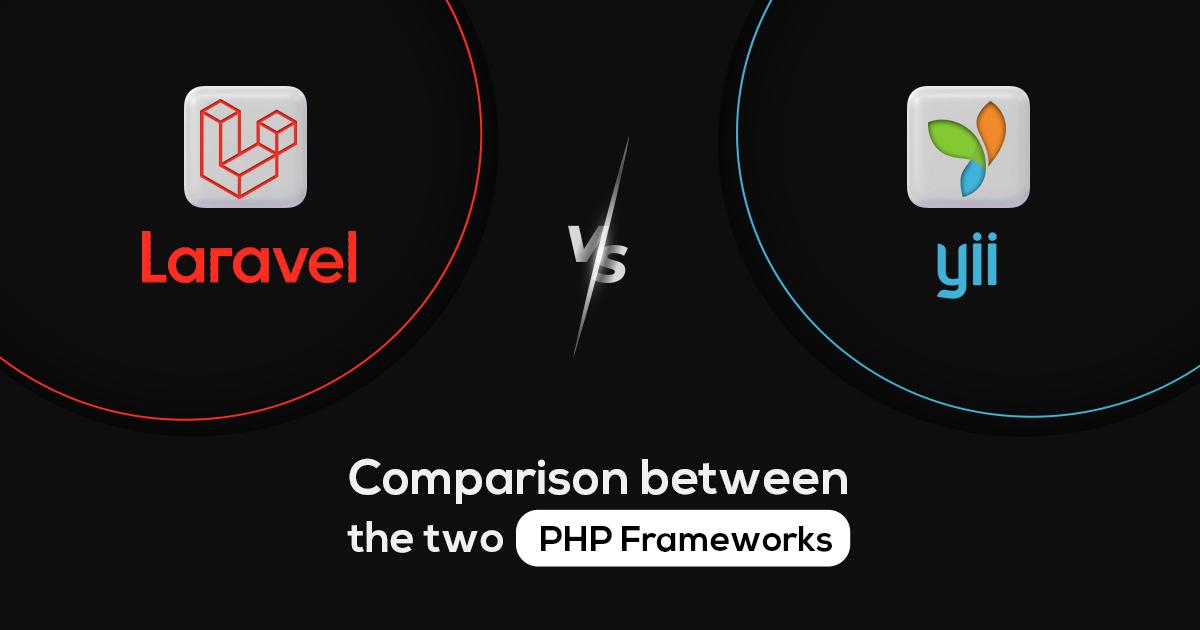
Hypertext Preprocessors, or PHP, is a general-purpose programming language designed to build a web application or website. PHP frameworks are open-source languages with built-in features that improve the performance and software development lifecycle.
PHP is among the first server-side scripting languages that can be embedded into HTML, which helps add functionality to web pages easily, without any external files for data. PHP codes are mixed with HTML codes and can be combined with various other web frameworks as well.
A PHP file comprises HTML tags, texts, and scripts with an extension of .php, .php3, or .phtml. It manages a dynamic website’s active content, sessions, database, cookies, and much more.
The PHP syntax is the same as that of C, C++, and Java. PHP frameworks provide libraries for common functions, which helps reduce the amount of original code developers write from scratch. The two such open-source PHP frameworks are Laravel and Yii.
What Is Laravel?
Laravel is known for its elegant syntax, robust features, and strong community support. It provides a great developer experience with powerful tools and features like routing, ORM, database migrations, and unit testing. Laravel development services are also popular for their easy-to-use templating engine, Blade, and built-in authentication and authorization system.
What Is Yii?
Yii, the acronym for ‘Yes It Is’, is a powerful framework for building scalable web apps. This is an open-source, lightweight PHP framework used to develop modern web applications smoothly. It works on MVC architecture. This framework accelerates the web development process.
Adding more to this, Yii is a simple-to-use, high-performance, and component-based PHP framework for developing modern web applications. It is suitable for all web applications, making it a universal web development framework.
Comparing Laravel vs Yii Frameworks
Laravel and Yii are two of the most popular PHP Frameworks. Both these PHP frameworks offer powerful tools and features for building web applications. When comparing Laravel vs Yii, developers can choose based on their specific project requirements and personal preferences.
While both frameworks have their strengths and weaknesses, choosing the ‘better’ framework depends on your specific needs and preferences.
Here’s a comparison of the two PHP frameworks:
Ease Of Use
Laravel has a simple and easy syntax and a clean and intuitive structure that makes it easy for developers to understand and use. It also offers an out-of-the-box and rich set of features, including routing, database migration, and authentication. On the other hand, Yii initially has difficulty learning and understanding due to its more complex syntax and configuration. However, it offers a flexible and modular structure that allows developers to customize and optimize their applications.
Winner – Laravel
Performance
Yii is known for its exceptional performance and scalability, especially when handling high-traffic applications. It achieves this through caching, lazy loading, and optimized database queries. Laravel is also fast but not as quick as Yii. It focuses on providing a great developer experience and a wide range of features.
Winner – Yii
Templating
Laravel has its own templating engine called Blade, which offers easy syntax and greater flexibility. It allows developers to create reusable templates and includes features such as conditional statements and loops. Whereas Yii supports multiple templating engines, including Twig and Smarty. This gives developers more options but makes it harder to choose the right one for their needs.
Winner – Laravel
Database
Both Laravel and Yii offer robust database features, including support for multiple databases, including MySQL, PostgreSQL, SQLite, query building, and ORM (Object-Relational Mapping). Laravel uses Eloquent ORM, which provides an easy-to-use interface for database interaction. While Yii uses Active Record, which is more flexible and complex.
Winner – Laravel
Security
Both frameworks offer a range of security features, including encryption, hashing, and CSRF (Cross-Site Request Forgery) protection. Apart from this, Laravel provides a built-in authentication and authorization system, making it easy to secure web applications. Yii offers RBAC (Role-Based Access Control), which allows developers to define access control rules based on user roles and permissions.
Winner – Laravel
Community Support
Laravel has a large and active community of developers with many resources available, including documentation, forums, and tutorials. It also has many third-party packages and plugins, which extend the framework’s functionality. Yii also has a strong community, which is smaller than Laravel’s. However, Yii does have a more formalized extension repository, which makes it easier to find and install third-party packages.
Winner – Laravel
Testing
Laravel and Yii offer built-in testing support, including unit and functional testing. Laravel uses PHPUnit for testing, while Yii uses Codeception. Both frameworks make writing and running tests easy, which can help developers catch bugs and ensure that their code is working as expected. So In comparison of Laravel vs Yii in terms of testing, both will be good
Winner – Both
Debugging
Laravel and Yii have built-in support for debugging, including error reporting and logging. Laravel uses the popular Monolog library for logging, allowing developers to track their applications’ errors and bugs easily. While on the other hand, Yii has its own logging and debugging tools, including a powerful debugger toolbar that provides information on database queries, performance metrics, and more.
Winner – Laravel
Migration
Laravel and Yii have built-in database migration support, allowing developers to manage changes to their database schema over time easily. Laravel and Yii have a built-in database schema builder that allows developers to create and manage database tables and indexes.
Laravel’s migration system is based on the popular principle database migration library, providing a simple, flexible way to create and manage database migrations. Yii’s migration system is similar to Laravel’s, but it uses its own implementation of the migration library, and is hence, better.
Winner – Yii
You can create a login page, design a form, create forums, dynamic and static websites, and many more with PHP. Ultimately, evaluating both frameworks and choosing the best fit for your needs and preferences is important.
Wrapping Up!
To conclude Laravel vs Yii, the use case plays an important role. Laravel is a great choice for developers who want an easy-to-use framework with a great developer experience and strong community support. Yii is a great choice for developers who prioritize performance and scalability and need to build high-traffic applications.
Laravel and Yii are excellent frameworks for building web applications. Choosing between the two will depend on your specific needs and preferences, so evaluating both frameworks carefully is essential before taking the leap.
Hope this blog on Laravel vs Yii helped you in getting closer to your goal.








